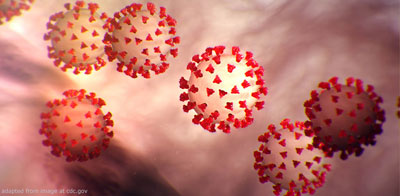Widespread Covid-19 coronavirus at Georgia overnight camp, despite prior testing and partial mitigation strategies; highlights risk of rapid spread and importance of more thorough mitigation strategies
The CDC announced on Friday, July 31, that there was "efficient" spread of Covid-19 coronavirus at a Georgia overnight camp for children that had practiced some, but not all, recommended mitigating strategies. [text of CDC news release follows fuirther below]
Notably the camp did not require campers to wear masks.
Significance of the case study is heightened considering the push, from some quarters to reintroduce expanded in-person school attendance.
Although some mitigation strategies were carried out at the camp, such as pre-arrival testing, extra sanitizing, and staff wearing masks, as mentioned, the camp failed to require campers to wear masks.
Additionally, large groups shared cabins, during which, presumably no one wore masks while sleeping. There also were instances of activities such as singing or cheering that could have furthered the spread.
The CDC observed:
"[A study of] ... transmission at an overnight camp in Georgia found efficient spread of the virus among campers and staff ... noting [that] key steps to minimize the risk for [Covid-19 coronavirus] SARS-CoV-2 introduction and transmission in camps were not strictly followed. [While] [t]he camp adopted some mitigation steps found in CDC Suggestions for Youth and Summer Camps to minimize ... risk ... to include cohorting of attendees by cabin and enhanced cleaning and disinfection. ... the camp did not require the 363 campers to wear masks, only the staff. Additionally .... indoor and outdoor activities ... included daily vigorous singing and cheering, which might have contributed to transmission. Settings, like multi-day, overnight summer camps, pose a unique challenge ... considering the amount of time campers and staff members spend in close proximity. Correct and consistent use of cloth masks, rigorous cleaning and sanitizing, social distancing, and frequent hand washing ... recommended in CDC’s recently released guidance to reopen America’s schools, are critical to prevent transmission of the virus in settings involving children ...."
News reports pegged the spread at 44%, with 260 testing positive out of the 344 campers and staff members who were tested, from a total population of well over 500.
Georgia already had been more of a "hot spot" as a state than might ordinarily have been expected. Yet, overall, the spread was arguably ominous considering the push, from some quarters, for a generalized reopening of in-person schooling for children.
Additional Resources:
Study highlights importance of CDC mitigation strategies - CDC
44% of attendees at Georgia overnight camp test positive for COVID-19 - UPI
More than 200 kids infected at Georgia overnight camp, CDC says
260 sick at camp: CDC says children susceptible to COVID-19
Coronavirus spread among children in Georgia youth camp, CDC says
Text of CDC News Release:
Study highlights importance of CDC mitigation strategies
Media Statement
Embargoed until: Friday, July 31, 2020, 1 p.m. ET
Contact: Media Relations (404) 639-3286
cdc.gov/media/releases/2020/s0731-study-highlights-importance-mitigation-strategies.html
Today’s MMWR on SARS-CoV-2 transmission at an overnight camp in Georgia found efficient spread of the virus among campers and staff while noting key steps to minimize the risk for SARS-CoV-2 introduction and transmission in camps were not strictly followed.
The camp adopted some mitigation steps found in CDC Suggestions for Youth and Summer Camps to minimize the risk for SARS-CoV-2 introduction and transmission to include cohorting of attendees by cabin and enhanced cleaning and disinfection. However, the camp did not require the 363 campers to wear masks, only the staff. Additionally, camp attendees engaged in a variety of indoor and outdoor activities that included daily vigorous singing and cheering, which might have contributed to transmission.
Settings, like multi-day, overnight summer camps, pose a unique challenge when it comes to preventing the spread of infectious diseases considering the amount of time campers and staff members spend in close proximity. Correct and consistent use of cloth masks, rigorous cleaning and sanitizing, social distancing, and frequent hand washing strategies, which are recommended in CDC’s recently released guidance to reopen America’s schools, are critical to prevent transmission of the virus in settings involving children and are our greatest tools to prevent COVID-19. For research on disease transmission in a congregate setting SARS-CoV-2 Infections and Serologic Responses from a Sample of U.S. Navy Service Members — USS Theodore Roosevelt, April 2020.
For research on disease transmission in a congregate setting SARS-CoV-2 Infections and Serologic Responses from a Sample of U.S. Navy Service Members — USS Theodore Roosevelt, April 2020.
For research on how universal mask use prevents disease transmission Absence of Apparent Transmission of SARS-CoV-2 from Two Stylists After Exposure at a Hair Salon with a Universal Face Covering Policy — Springfield, Missouri, May 2020.
###
U.S. DEPARTMENT OF HEALTH AND HUMAN SERVICES
